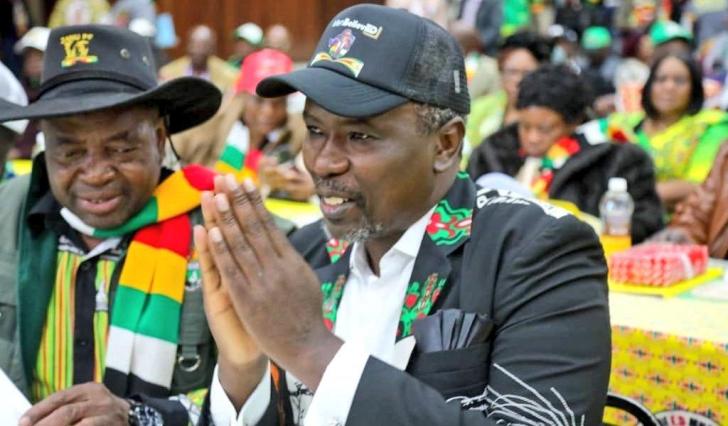News / National
'Tagwirei lacks Zanu-PF grassroots support,' says activist
7 hrs ago | Views

Political activist and editor of 'Footprints in the Chains: The Life Story of Job Sikhala' Rejoice Ngwenya has dismissed the possibility of businessman Kudakwashe Tagwirei succeeding President Emmerson Mnangagwa, describing the tycoon's alleged political ambitions as lacking grassroots support and posing a potential disaster for the ruling party.
Ngwenya's comments come amid growing speculation that Mnangagwa's allies are grooming Tagwirei to take over the reins of power ahead of the 2028 general elections. The speculation follows internal resistance to Mnangagwa's rumoured bid for a constitutionally prohibited third term.
"This is a simplistic, if not naive, narrative," Ngwenya told reporters. "Zanu-PF has no clear succession strategy. They rely on populist gravitas, and I can tell you Tagwirei has no grassroots credibility."
He added: "It would be catastrophic for ED [Mnangagwa] to present him as a 2028 candidate. And besides, who really likes ED in the Central Committee? Which provinces would vote for Tagwirei in that party?"
The comments underscore mounting tensions within Zanu-PF as factions begin jostling for position ahead of the 2028 poll. Vice-President Constantino Chiwenga is widely believed to be the leading contender to succeed Mnangagwa, who turns 82 this year and is constitutionally barred from seeking another term.
Ngwenya outlined the current state of factionalism within the ruling party, stating: "There are three factions in Zanu-PF: the ED faction, the Chiwenga faction, and the neutral, non-committal, unsure faction. Definitely, the Chiwenga faction will say no—but we know how powerful it is. If it can shift attitudes in the military, then it has the capacity to hold sway."
Fueling the succession talk, Tagwirei has recently been seen presiding over Zanu-PF-organised events across the country, prompting speculation he is being positioned for a leadership role. However, his meteoric rise has drawn criticism and exposed friction at the highest levels of the party.
This week, the billionaire businessman reportedly faced humiliation when he was ejected from a Central Committee meeting at the Zanu-PF Headquarters in Harare. Sources claim Vice-President Chiwenga orchestrated his removal, citing procedural irregularities regarding his co-option.
Despite being endorsed by the Harare provincial leadership under Goodwills Masimirembwa, Tagwirei's nomination had not yet been ratified by the Central Committee — a critical step for formal inclusion in the party's powerful decision-making body.
"He walked into the Central Committee with opulence and confidence but left without participating. That incident alone shows a glaring ignorance of party statutes," said a source familiar with the matter.
Observers say Tagwirei's swift rise through Zanu-PF ranks has unsettled many within the party, with long-serving members wary of what they perceive as an elite-driven political project lacking legitimacy among ordinary supporters.
While Tagwirei remains a powerful and influential figure in Zimbabwe's business and political landscape, analysts like Ngwenya argue that his lack of political capital and factional backing could ultimately derail any presidential ambitions.
"Zanu-PF power isn't about wealth. It's about structures, loyalty, and liberation credentials. Tagwirei ticks none of those boxes," Ngwenya concluded.
Ngwenya's comments come amid growing speculation that Mnangagwa's allies are grooming Tagwirei to take over the reins of power ahead of the 2028 general elections. The speculation follows internal resistance to Mnangagwa's rumoured bid for a constitutionally prohibited third term.
"This is a simplistic, if not naive, narrative," Ngwenya told reporters. "Zanu-PF has no clear succession strategy. They rely on populist gravitas, and I can tell you Tagwirei has no grassroots credibility."
He added: "It would be catastrophic for ED [Mnangagwa] to present him as a 2028 candidate. And besides, who really likes ED in the Central Committee? Which provinces would vote for Tagwirei in that party?"
The comments underscore mounting tensions within Zanu-PF as factions begin jostling for position ahead of the 2028 poll. Vice-President Constantino Chiwenga is widely believed to be the leading contender to succeed Mnangagwa, who turns 82 this year and is constitutionally barred from seeking another term.
Ngwenya outlined the current state of factionalism within the ruling party, stating: "There are three factions in Zanu-PF: the ED faction, the Chiwenga faction, and the neutral, non-committal, unsure faction. Definitely, the Chiwenga faction will say no—but we know how powerful it is. If it can shift attitudes in the military, then it has the capacity to hold sway."
Fueling the succession talk, Tagwirei has recently been seen presiding over Zanu-PF-organised events across the country, prompting speculation he is being positioned for a leadership role. However, his meteoric rise has drawn criticism and exposed friction at the highest levels of the party.
This week, the billionaire businessman reportedly faced humiliation when he was ejected from a Central Committee meeting at the Zanu-PF Headquarters in Harare. Sources claim Vice-President Chiwenga orchestrated his removal, citing procedural irregularities regarding his co-option.
Despite being endorsed by the Harare provincial leadership under Goodwills Masimirembwa, Tagwirei's nomination had not yet been ratified by the Central Committee — a critical step for formal inclusion in the party's powerful decision-making body.
"He walked into the Central Committee with opulence and confidence but left without participating. That incident alone shows a glaring ignorance of party statutes," said a source familiar with the matter.
Observers say Tagwirei's swift rise through Zanu-PF ranks has unsettled many within the party, with long-serving members wary of what they perceive as an elite-driven political project lacking legitimacy among ordinary supporters.
While Tagwirei remains a powerful and influential figure in Zimbabwe's business and political landscape, analysts like Ngwenya argue that his lack of political capital and factional backing could ultimately derail any presidential ambitions.
"Zanu-PF power isn't about wealth. It's about structures, loyalty, and liberation credentials. Tagwirei ticks none of those boxes," Ngwenya concluded.
Source - newzimbabwe
























